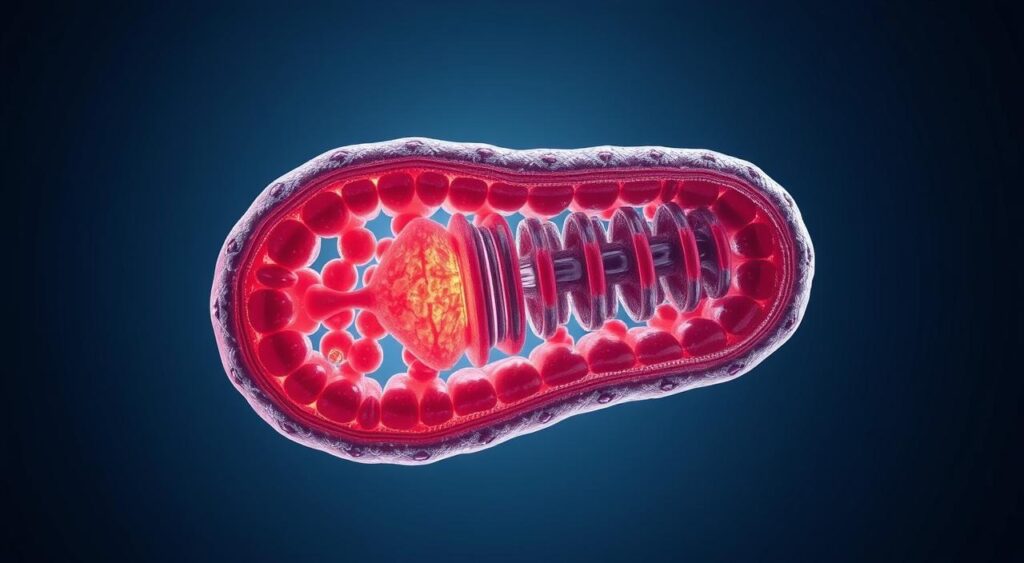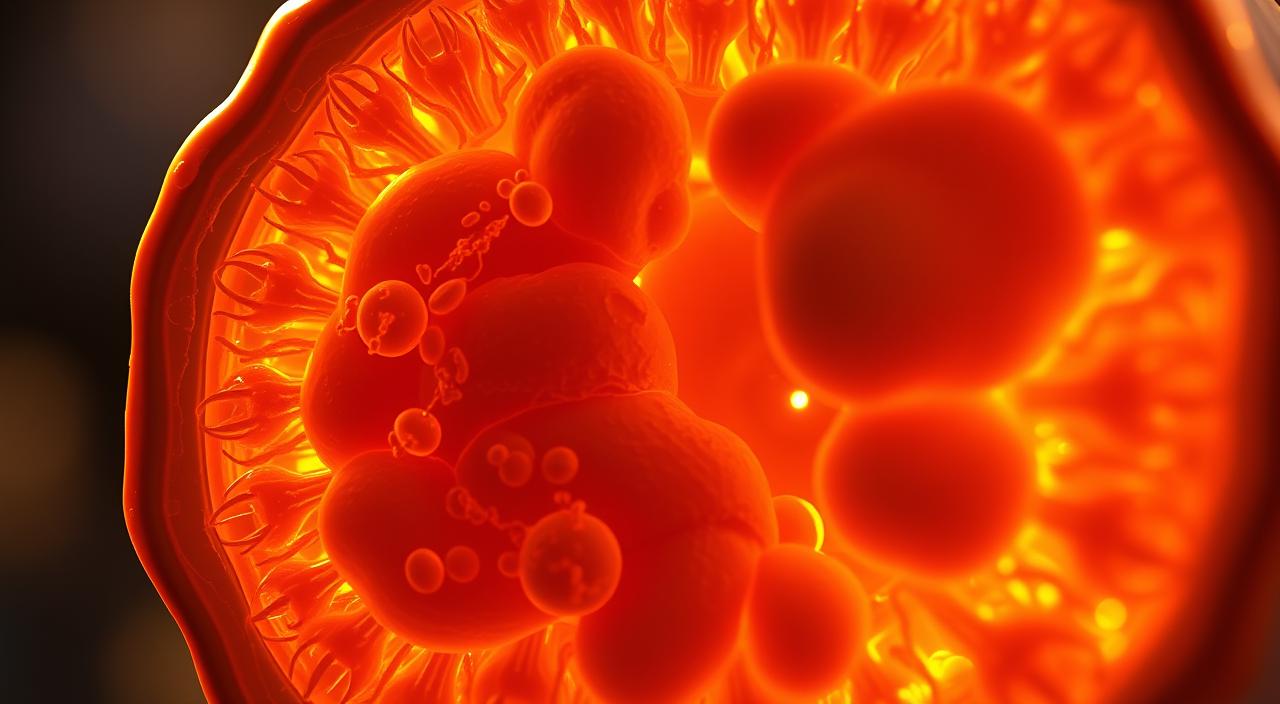Mitochondrial Health: The Key to Increased Energy and Wellbeing. The human body gets most of its energy from mitochondria. Mitochondrial dysfunction is linked to many diseases, like neurodegenerative disorders. This shows how vital it is to keep mitochondria working well for our health.
Mitochondrial Health: The Key to Increased Energy and Wellbeing
When mitochondria work right, they make energy efficiently. This helps keep cells and organs, like the heart and brain, healthy. Studies prove that good energy production is key to staying healthy. Learning about mitochondria’s role in energy and cell health helps us fight diseases linked to mitochondrial problems. Mitochondrial Health: The Key to Increased Energy and Wellbeing.
MitoLyn

Mitochondrial Health
- What Is MitoLyn?
- MitoLyn is a non‑stimulant dietary supplement designed to enhance mitochondrial efficiency—the process by which your body converts nutrients into cellular energy. Packaged as capsules, it targets metabolic slowdown, supporting natural fat burning and steady energy levels without relying on caffeine or stimulants
- Boosts mitochondrial energy
Ingredients like CoQ10 and L‑carnitine aid fat conversion into usable energy—even during rest or light activity - Enhances fat oxidation & metabolic flexibility
Better mitochondrial function helps you shift between burning carbs and fats, improving fat loss over time - Reduces inflammation & oxidative stress
Antioxidants such as alpha‑lipoic acid support insulin sensitivity and cellular health - Stimulant‑free energy support
No caffeine means no jitters, crashes, or sleep disruption. Ideal for users sensitive to stimulants - MitoLyn blends several clinically studied compounds:
- L‑Carnitine Tartrate – fuels mitochondrial fat transport
- Coenzyme Q10 (CoQ10) – supports ATP production for energy
- Alpha‑Lipoic Acid – antioxidant that aids blood sugar regulation
- D‑Ribose – boosts cellular ATP recovery
- Rhodiola Rosea, Astaxanthin, Amla (Indian Gooseberry), and Anthocyanin complex – promote mitochondrial function, adaptogenic support, and fat oxidation
- Adults over 30 with sluggish metabolism, low energy, or stubborn belly fat
- Individuals wanting fat loss support without stimulants or intense exercise
- Caution: Not evaluated in pregnant/nursing women, children under 18, or those on meds without consulting a physician
- How Fast Does It Work?
- Users often notice energy improvements and reduced cravings within 1–2 weeks
- Physical changes like waistline reduction typically begin around 3–6 weeks, especially when combined with proper hydration, nutrition, and light activity
Key Takeaways
- Mitochondria generate over 90% of the body’s energy.
- Mitochondrial dysfunction is linked to various diseases.
- Optimal mitochondrial function is vital for overall wellbeing.
- Energy production through cellular respiration supports cell health.
- Maintaining mitochondrial health is essential for preventing diseases.
Understanding Mitochondria: The Powerhouses of Your Cells
Mitochondria are complex organelles that play a vital role in generating energy for the cell. They are often referred to as the powerhouses of the cell. This is because they are key in energy production through cellular respiration.
What Are Mitochondria?
Mitochondria are organelles found inside the cells of most eukaryotes, including humans. They are dynamic structures that change shape, divide, and fuse. Mitochondria have two main parts: the outer membrane and the inner membrane.
The inner membrane is folded into cristae. These folds increase the surface area for energy production.
The Critical Role of Mitochondria in Energy Production
The primary function of mitochondria is to produce energy for the cell. They do this through cellular respiration. This process breaks down glucose and other nutrients to produce ATP (adenosine triphosphate).
ATP is the energy currency of the cell. It powers various cellular activities.
Breaks down glucose into pyruvate
| Process | Description | Outcome |
|---|---|---|
| Glycolysis | Produces a small amount of ATP and NADH | |
| Citric Acid Cycle | Processes pyruvate into acetyl-CoA, producing more NADH and FADH2 | Increases the electron-rich molecules for the electron transport chain |
| Electron Transport Chain | Uses electrons from NADH and FADH2 to pump protons across the membrane | Creates a proton gradient that drives ATP synthase to produce ATP |
Mitochondrial DNA and Its Unique Properties
Mitochondrial DNA (mtDNA) is separate from the cell’s nuclear DNA. It is inherited maternally. Mutations in mtDNA have been linked to various diseases, including mitochondrial disorders. Mitochondrial Health: The Key to Increased Energy and Wellbeing.
These disorders affect energy production. The unique properties of mtDNA make it a critical area of study. It helps us understand mitochondrial function and dysfunction. Mitochondrial Health: The Key to Increased Energy and Wellbeing.
The Science of Mitochondrial Function and Metabolism
Mitochondrial function is a complex process. It involves many cellular components to produce energy. This science shows how vital mitochondria are for cellular metabolism. Mitochondrial Health: The Key to Increased Energy and Wellbeing.
The ATP Production Process
The ATP production in mitochondria mainly happens through the electron transport chain. This chain is a series of protein complexes in the mitochondrial inner membrane. Oxidative phosphorylation uses electrons to create a proton gradient across the membrane. Mitochondrial Health: The Key to Increased Energy and Wellbeing.
This gradient powers ATP synthase to make ATP. ATP is the cell’s energy currency.
Electron Transport Chain Explained
The electron transport chain is key to mitochondrial function. It generates the proton gradient needed for ATP production. The chain includes several protein complexes (I through IV) and two electron carriers, coenzyme Q, and cytochrome c.
As electrons move through these complexes, protons are pumped across the membrane. This creates the gradient that drives ATP synthase to produce ATP. Mitochondrial Health: The Key to Increased Energy and Wellbeing.
| Complex | Function |
|---|---|
| Complex I | Transfers electrons from NADH to coenzyme Q |
| Complex II | Transfers electrons from FADH2 to coenzyme Q |
| Complex III | Pumps protons and transfers electrons to cytochrome c |
| Complex IV | Transfers electrons to oxygen, producing water |
Beyond Energy: Other Vital Cellular Functions
Mitochondria are important for more than just energy production. They play a role in cell signaling, cell differentiation, and cell death (apoptosis). Their function is essential for keeping the cell balanced and responding to stress.
Signs of Compromised Mitochondrial Health
Mitochondrial dysfunction can severely impact health, causing symptoms that affect energy, thinking, and physical ability. When mitochondria don’t work right, cells can’t make the energy they need. This leads to many problems that are hard to spot because they can look like other things. Mitochondrial Health: The Key to Increased Energy and Wellbeing.
There are many signs of mitochondrial health problems. Chronic fatigue, cognitive impairment, and physical symptoms like muscle weakness and digestive issues are common. These signs can come from many different things, so it’s key to know what’s causing them. Mitochondrial Health: The Key to Increased Energy and Wellbeing.
Chronic Fatigue and Energy Depletion
Chronic fatigue is a big sign of mitochondrial trouble. It’s feeling very tired all the time, even after resting. This happens because cells can’t make enough ATP, the energy they need to work.

Cognitive Impacts and Brain Fog
Mitochondrial problems also hurt how well we think. Symptoms like brain fog, memory problems, and feeling less mentally clear happen. The brain needs energy from mitochondria to work well, and without it, thinking gets harder.
Physical Symptoms of Mitochondrial Dysfunction
Physical signs of mitochondrial trouble are many and varied. They include muscle weakness, trouble exercising, and problems with digestion and metabolism. These happen because mitochondria are key to muscle and metabolic health.
Muscle Weakness and Exercise Intolerance
Muscle weakness and trouble exercising are common in people with mitochondrial issues. Not being able to do everyday tasks or exercise without getting very tired is a big sign of trouble.
Digestive and Metabolic Issues
Mitochondrial problems can also cause digestive and metabolic issues. This includes trouble absorbing nutrients, insulin resistance, and metabolic syndrome. These problems happen because mitochondria are important for many body systems, like digestion and hormones.
In short, knowing the signs of mitochondrial trouble is key to fixing the problem. By understanding these signs, people can start to improve their health and feel better overall.
Factors That Damage Mitochondrial Health
Mitochondrial health is key for energy and wellbeing. But, many factors can harm it, like oxidative stress and environmental toxins. Knowing these threats helps us protect our mitochondria.
Oxidative Stress and Free Radical Damage
Oxidative stress happens when free radicals outdo our body’s antioxidants. Free radicals can harm mitochondrial DNA and proteins. This hurts energy production and starts a cycle of damage.
Environmental Toxins and Their Impact
Environmental toxins, like pesticides and heavy metals, harm mitochondria. They mess up the electron transport chain, which is bad for energy. It’s important to avoid these toxins to keep mitochondria working well.
| Toxin | Source | Impact on Mitochondria |
|---|---|---|
| Pesticides | Agricultural runoff, household use | Disrupts electron transport chain |
| Heavy Metals | Industrial pollution, contaminated water | Damages mitochondrial DNA |
Lifestyle Factors: Diet, Exercise, and Sleep
Lifestyle affects mitochondrial health a lot. Eating too much processed food and sugar is bad. But, exercising regularly and getting enough sleep are good for them.
- Diet: High intake of processed foods and sugar
- Exercise: Regular physical activity enhances mitochondrial biogenesis
- Sleep: Adequate rest for mitochondrial repair
Aging and Mitochondrial Decline
Aging hurts mitochondrial function. As we get older, our mitochondria make less ATP. Knowing how aging affects them helps us fight age-related decline.
Optimizing Mitochondrial Health Through Nutrition
Nutrition is key for healthy mitochondria, which are vital for energy and cell function. Eating right supports mitochondria, while bad diet harms them.
Essential Nutrients for Mitochondrial Function
Mitochondria need various nutrients to work well. These include vitamins, minerals, and compounds for energy and structure.
CoQ10, L-Carnitine, and B Vitamins
CoQ10 is vital for ATP production. L-carnitine helps fatty acids into mitochondria for energy. B vitamins, like B12 and riboflavin, are key for energy and mitochondrial support.
- CoQ10 supports electron transport chain function.
- L-carnitine facilitates fatty acid transport into mitochondria.
- B vitamins are essential for energy metabolism.
Magnesium, Zinc, and Other Minerals
Magnesium and zinc are vital for mitochondria. Magnesium helps make ATP, and zinc supports mitochondrial proteins.
- Magnesium is essential for ATP production.
- Zinc supports mitochondrial protein structure and function.
Antioxidant-Rich Foods That Protect Mitochondria
Foods like fruits, vegetables, and nuts protect mitochondria. Berries are full of antioxidants that fight oxidative stress.
Dietary Approaches: Ketogenic, Mediterranean, and Fasting
The ketogenic diet and Mediterranean diet help mitochondria. Fasting also benefits mitochondria by promoting autophagy and biogenesis.
Supplements That Support Mitochondrial Wellness
Some supplements help mitochondria too. CoQ10, N-acetyl cysteine, and others support energy and reduce stress.
Lifestyle Strategies for Enhanced Mitochondrial Function
Lifestyle choices greatly affect our mitochondria’s health and function. By making certain changes, we can boost our mitochondria’s performance. This leads to better health and wellbeing.
Exercise Protocols That Boost Mitochondrial Biogenesis
Exercise is key for growing more mitochondria. High-intensity interval training (HIIT) is very effective. It helps create new mitochondria and makes the ones we have work better.
- Do HIIT workouts 2-3 times a week
- Add strength training to build muscle
- Make sure to do at least 150 minutes of moderate exercise weekly
Stress Management and Mitochondrial Protection
Too much stress hurts our mitochondria, causing damage. Techniques like meditation and yoga help protect them. They reduce stress and keep mitochondria healthy.
- Try mindfulness and meditation every day
- Do yoga or other activities that reduce stress
- Spending time in nature is also beneficial
Sleep Optimization for Cellular Repair
Good sleep is vital for fixing cells and improving mitochondria. While we sleep, our cells repair themselves, and mitochondria work better.
- Go for 7-9 hours of sleep each night
- Keep a regular sleep schedule
- Make your sleep area comfortable
MitoLyn

Mitochondrial Health
- Maqui Berry
- Rich in anthocyanins—boosts mitochondrial biogenesis and fat oxidation.
- Supports improved cholesterol levels and reduced inflammation
- Rhodiola Rosea
- Adaptogen containing rosavin/salidroside—reduces cortisol, combats stress/fatigue.
- Supports ATP production and enhanced energy/mental clarity
- Haematococcus (Astaxanthin)
- Powerful antioxidant from red algae; promotes mitochondrial health, endurance, joint support
- Amla (Indian Gooseberry)
- Loaded with vitamin C, flavonoids; enhances digestion, nutrient absorption, cellular repair .
- 5. Theobroma Cacao (Cocoa Extract)
- High in epicatechin; improves blood flow, heart health, mood, and mitochondrial function
- Schisandra
- Antioxidant-rich berry; supports liver detox, hormonal balance, skin, and calorie burning
- Formulated with vegetable cellulose capsules, rice flour, magnesium stearate, silicon dioxide—free from stimulants, GMOs, fillers
- Energy + Endurance: Boosts ATP production for sustained energy—users report no crashes or jitters
- Weight & Metabolism Support: Powers fat-burning at rest and during activity by enhancing mitochondrial function
- Mood & Stress: Via adaptogens like Rhodiola and Schisandra, helps reduce anxiety and stabilize mood
- Sleep Quality: Strong mitochondrial support promotes better circadian rhythms and more restorative sleep
- Digestion & Gut Health: Amla and Schisandra help balance gut microbiome, reduce bloating, and enhance nutrient absorption
- Cardiovascular Health: Ingredients like Maqui Berry, cacao, and mitochondrial support may improve cholesterol, blood pressure, and visceral fat
- Skin, Hair & Nails: Antioxidants help strengthen follicles and connective tissues, leading to healthier skin, hair, and nails .
- Immune & Joint Health: Astaxanthin provides cellular protection, joint support, and immune enhancement .
- Quality & Manufacturing
- Produced in an FDA-registered, GMP-certified U.S. lab.
- Free from harsh chemicals, stimulants, and GMOs; each batch undergoes third-party testing.
- When Results Typically Appear
- Energy & mood: noticeable within 1–2 weeks.
- Digestion & sleep: improvements around week 2–3.
- Weight changes: gradual, beginning 4–8 weeks, continuing with ongoing use and lifestyle support
Cold Exposure and Heat Therapy Benefits
Cold showers and heat therapy are good for our mitochondria. Cold showers boost mitochondrial growth. Heat therapy makes them more efficient.
| Therapy | Benefits |
|---|---|
| Cold Exposure | More mitochondrial growth, better insulin use |
| Heat Therapy | Better mitochondrial function, less oxidative stress |
Conclusion: Embracing Mitochondrial Wellness for Lifelong Vitality
Mitochondrial health is key for keeping energy up and feeling good. Knowing what affects mitochondria helps us improve their function. Eating right, exercising, and managing stress are important for this.
Eating a ketogenic or Mediterranean diet and foods high in antioxidants can protect mitochondria. Exercise that boosts mitochondrial growth, along with stress and sleep management, also helps.
By adopting these healthy habits and diets, we can boost our mitochondrial wellness. This leads to more energy and better health. Taking care of our mitochondria is a smart way to live a long, healthy life.












